人教版英语必修一第二单元测试
- 格式:doc
- 大小:50.00 KB
- 文档页数:6
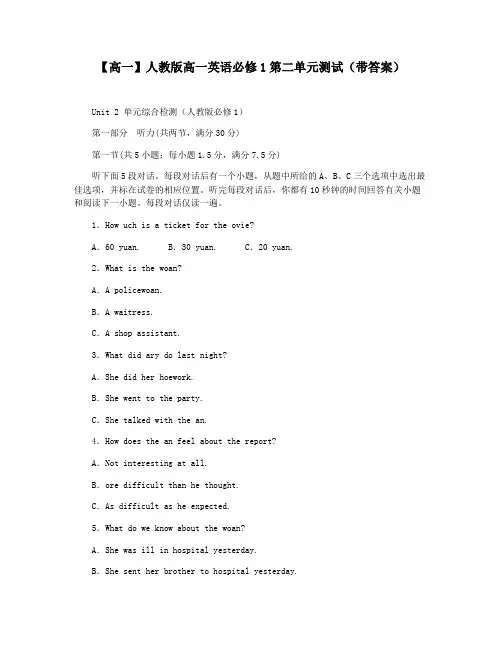
【高一】人教版高一英语必修1第二单元测试(带答案)Unit 2 单元综合检测(人教版必修1)第一部分听力(共两节,满分30分)第一节(共5小题;每小题1.5分,满分7.5分)听下面5段对话。
每段对话后有一个小题,从题中所给的A、B、C三个选项中选出最佳选项,并标在试卷的相应位置。
听完每段对话后,你都有10秒钟的时间回答有关小题和阅读下一小题。
每段对话仅读一遍。
1.How uch is a ticket for the ovie?A.60 yuan. B.30 yuan. C.20 yuan.2.What is the woan?A.A policewoan.B.A waitress.C.A shop assistant.3.What did ary do last night?A.She did her hoework.B.She went to the party.C.She talked with the an.4.How does the an feel about the report?A.Not interesting at all.B.ore difficult than he thought.C.As difficult as he expected.5.What do we know about the woan?A.She was ill in hospital yesterday.B.She sent her brother to hospital yesterday.C.She asked for a day off today.第二节(共15小题;每小题1.5分,满分22.5分)听下面5段对话或独白。
每段对话或独白后有几个小题,从题中所给的A、B、C三个选项中选出最佳选项,并标在试卷的相应位置。
听每段对话或独白前,你将有时间阅读各个小题,每小题5秒钟;听完后,各小题将给出5秒钟的作答时间。
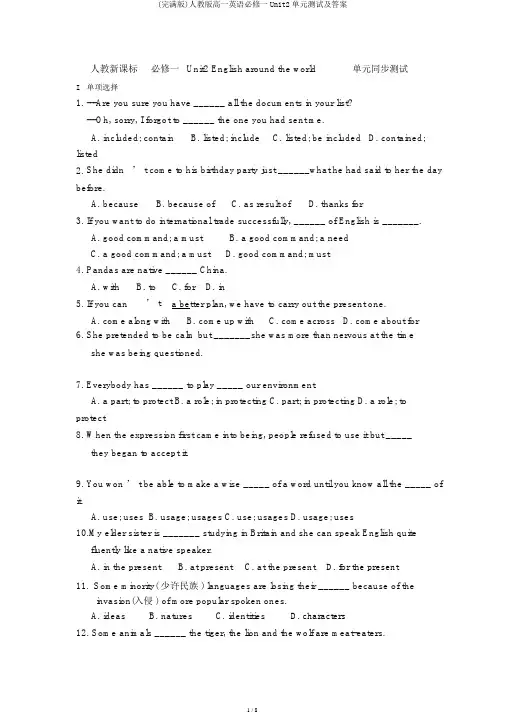
人教新课标必修一Unit2 English around the world单元同步测试I.单项选择1.---Are you sure you have ______ all the documents in your list?---Oh, sorry, I forgot to ______ the one you had sent me.A. included; containB. listed; includeC. listed; be includedD. contained; listed2.She didn ’ t come to his birthday party just ______what he had said to her the day before.A. becauseB. because ofC. as result ofD. thanks for3.If you want to do international trade successfully, ______ of English is _______.A. good command; a mustB. a good command; a needC. a good command; a mustD. good command; must4.Pandas are native ______ China.A. withB. toC. forD. in5.If you can’ t a better plan, we have to carry out the present one.A. come along withB. come up withC. come acrossD. come about for6.She pretended to be calm but _______she was more than nervous at the timeshe was being questioned.7. Everybody has ______ to play _____ our environment.A. a part; to protectB. a role; in protectingC. part; in protectingD. a role; to protect8.When the expression first came into being, people refused to use it but _____they began to accept it.9.You won ’ t be able to make a wise _____ of a word until you know all the _____ of it.A. use; usesB. usage; usagesC. use; usagesD. usage; uses10.My elder sister is _______ studying in Britain and she can speak English quitefluently like a native speaker.A. in the presentB. at presentC. at the presentD. for the present11.Some minority( 少许民族 ) languages are losing their ______ because of theinvasion(入侵 ) of more popular spoken ones.A. ideasB. naturesC. identitiesD. characters12. Some animals ______ the tiger, the lion and the wolf are meat-eaters.A. such likeB. such asC. for exampleD. including13. Young students are ______ not to smoke both in and out school.A. suggestedB. requestedC. hopedD. invited14.No product is allowed to go into the market if it fails to _____ the qualitystandard.A. liveB. come up toC. meetD. go through15.The foreign customer ______ a polite request asking about the price of the flowervase, but the assistant looked puzzled, as she didn’ t understand any English.A. tookB. offeredC. madeD. asked16.Some people are good at _____ voices on the phone while others ______.A. knowing; aren’B.t recognizing; don’C. tknowing; don’ tD. recognizing;aren ’ t17.Different people from different provinces speak English _____ different accents.A. inB. byC. withD. on18.______ the direction of the experienced experts, they successfully carried out theexperiment.19. Because all the roads leading to the mountain village ______, the rescue workerswere not able to reach it to help.A. were blockedB. are blockedC. have been blockedD. had beenblocked20. American English is more or less different _____British English ______pronunciation and spelling.A. from; inB. with; inC. from; withD. with; on21.---Excuse me, Madam but is this the way to the town center? I am afraid I ______the right direction.---Keep on walking and you can’ t miss it.A. don ’ t walk inB. am not walking inC. haven ’ t walked withD. am not walking wi th22.--Do you think it true that all the theories should ________ facts?-- I don ’ t suppose so. If so, there would be no predictions(预知)A. be made onB. be based onC. be set up withD. be built with23.---What do you think of my article, professor?---The former part is well written but _____ is just so so.A. the laterB. the last partC. latestD. the latter24.The old mother was ______to see his long lost son home.A. a little more than happyB. more than a little happyC. happy more than a littleD. a little more happy than25.There is ______ is called Mr. Smith in our workshop.A. no such man asB. no such a man asC. no such manD. no such a man that错误 !未找到引用源。
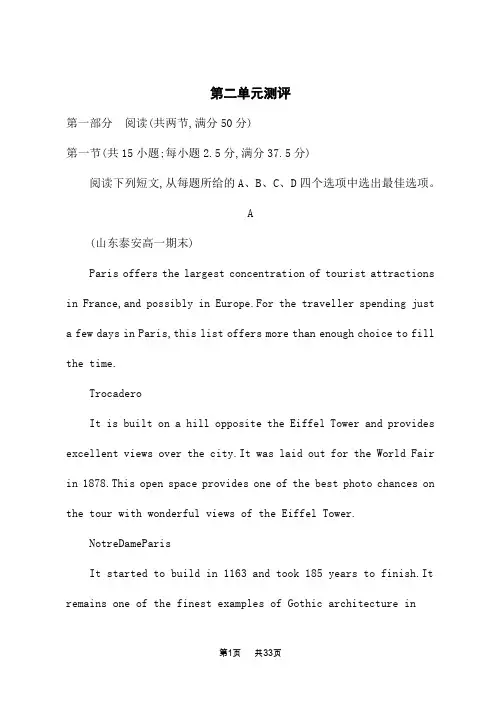
第二单元测评第一部分阅读(共两节,满分50分)第一节(共15小题;每小题2.5分,满分37.5分)阅读下列短文,从每题所给的A、B、C、D四个选项中选出最佳选项。
A(山东泰安高一期末)Paris offers the largest concentration of tourist attractions in France,and possibly in Europe.For the traveller spending just a few days in Paris,this list offers more than enough choice to fill the time.TrocaderoIt is built on a hill opposite the Eiffel Tower and provides excellent views over the city.It was laid out for the World Fair in 1878.This open space provides one of the best photo chances on the tour with wonderful views of the Eiffel Tower.NotreDameParisIt started to build in 1163 and took 185 years to finish.It remains one of the finest examples of Gothic architecture inEurope.This is the official center of Paris;the point from which all distances in France are measured.TheEiffelTowerIt was Gustav Eiffel who planned this huge,iron-work tower in 1887,with observation decks(露台)that provided a bird’s eye of the city.It’s ori ginal licence was for 20 years at which time it was due to be destroyed.But destruction of the national symbol was unthinkable.L’HoteldesInvalidesIt was used as homes and hospital for aged and injured pleted in 1709,L’ Hotel des Invalides now holds museums relating to France’s military history,but some of the buildings continue to be used as a home and hospital for those who used to serve in the army especially during the wars.TheLouvreIt is the world’s largest and most visited museum.It is famously home to Leonardo Da Vinei’s Mona Lisa.It used to be a Royal Palace with its history dating back to the 1100’s.1.What will you visit if you want to see remains of wars?A.Notre Dame Paris.B.Trocadero.C.L’ Hotel des Invalides.D.The Eiffel Tower.2.Which building has the longest history?A.Notre Dame Paris.B.The Louvre.C.Eiffel Tower.D.Trocadero.3.Where can you see Paris from above?A.Trocadero and The Eiffel Tower.B.Notre Dame Paris and The Eiffel Tower.C.The Eiffel Tower and L’ Hotel des I nvalides.D.L’ Hotel des Invalides and The Louvre.B(山东济南高一期末)If you have lived in New York City for many years,like I have,the skyline becomes part of you and your daily life.When I was invited to visit the recently completed Summit One Vanderbilt,Ne w York’s fourth-highest tower,I wasn’t euch.I felt like I’d seen it all and I thought that this observation deck(观测台)would be another space for a view of the city,but nothing else.Let me tell you something:I have never seen one like this before.It sits on top of a building on 42nd street and Vanderbilt,right next to Grand Central Station.Once you have ascended to the top floor,you step into air,which makes you feel like being at 1,000 feet above ground level with its mirrored floors.Once you make your way throughout the space,you feel like New York is part of a body,and your sense of space is challenged by the reflections of the light.The reflections create endless possibilities for photos and videos,and the light changes throughout the day.I took out my camera and began to take photos,feeling a connection with the city that no other observatory has been able to give me.Summit is something unique,an artwork with architecture.It will be an observatory that will change with the city.I personally can’t wait to take photos at sunset,or when winter arrives. 4.How did the author feel when invited to visit Summit One Vanderbilt?A.Curious.B.Happy.C.Amazed.D.Uninterested.5.What does the underlined word “ascended” in paragraph 3 probably mean?A.Risen.B.Turned.C.Referred.D.Adapted.6.What can be learned about Summit One Vanderbilt?A.It is the only tower in New York.B.It lies far from Grand Central Station.C.It provides a good place for taking photos.D.It is e the ground.7.What’s the purpose of th e text?A.To stress a point.B.To introduce a site.C.To raise awareness.D.To promote tourism.C(河北邯郸高一期中)Located in the southeast of Canada and with a population of approillion,Toronto is a big and beautiful city,which has developed from a relatively unknown place over the past half century to the center of culture,trade and communication in Canada.With its colourful ethnic mix,rich history and breathtaking buildings,Toronto offers non-stop adventures to the tourists.To get a sense of how big,various and magical Toronto is,the best place to start is the CN Tower.From this point,visitors can get a bird’s-eye view of the city’s amazing scenery and unique geography.In addition to being an important center of culture,trade and communication in Canada,Toronto is also a major muti-ethnic city.It is the most populous city in Canada and its citizens come from countries around the world and from different kinds of ethnicbackgrounds.Every day,in most places of the city,a hundred different languages can be heard on the streets,from Hindi to Greek to French.This,perhaps,eer Prime Minister Pierre Trudeau once said that Canada is a mosaic(嵌合体)of cultures and languages rather than a melting pot.Street signs in Toronto are mostly in English.Weekly and daily newspapers are published in various languages,and the city hosts the successful international film festival each September.It is also home to a popular baseball team the Toronto Blue Jays.Toronto has something for everyone.Moreover,Toronto has been rated one of the most livable cities in the world by United Nations Human Settlements Programme for many years.At the same time,Toronto is one of the safest,richest cities in the world with the highest standard of living.8.What’s the purpose of the teore tourists to To ronto.B.To introduce something about Canada.C.To introduce some famous sights of Toronto.D.To tell us how Toronto develops from the past.9.What can we know about Toronto from the text?A.Toronto is in the center of Canada.B.Toronto is a city with a history of half a century.C.The street signs in Toronto are all written in English.D.From the top of the CN Tower we can see the whole Toronto.10.How does the author like Toronto?A.It’s worth visiting.B.It’s just a common city in Canada.C.There are too many foreigners in the city.D.There aren’t many places of interest to visit.11.Where is this te?A.A personal diary.B.A news report.C.A tourist handbook.D.A student’s notebook.D(北京通州高一期中)In the South Atlantic Ocean,there is an island called Tristan da Cunha,which is a si the nearest town Cape Town in South Africa.There’s no airport on Tristan.Every month or so,a boat will bring visitors but not many.The boat will also bring mail and supplies.You can only see about 270 people,300 cows,500 sheep,and a whole lot of penguins there.The British tried to build a military base there in 1816.They gave up after a year.But a soldier and his family talked a few people into staying.Those people slowly built a community.Few trees grow on the island.So they found wood that washed ashore.They used it to build homes and boats.For food,they raised cows,sheep and pigs.They fished and planted potatoes.They promised to share everything they had.Sometimes ships brought supplies to Tristan.But for many years,no one there used money.Instead,people on the island traded potatoes for supplies.It cost five potatoes to send a piece of mail.Today,nearly everyone on Tristan is a farmer.The island’s main industry is fishing.It has a single factory that cans fish.Several times,bad luck has nearly destroyed the town on Tristan.In 1885,men died in a boat accident.That left 13 women and only 4 adult men on the island.Still,everyone stayed.In 1961,a bigger disaster struck.The town was destroyed by a volcanic eruption.All 290 people on the island moved to England.But soon,nearly all of them moved back to the island and rebuilt their town.What’s so special about life on this lonely island?For islanders like Harold Green,that’s an easy question to answer.Green has lived on Tristan his whole life.He left when the volcano erupted.But England was too loud and too crowded for him.He came back because the island is peaceful.12.What was used as money on Tristan in the past?A.Fish.B.Wood.C.Sheep.D.Potatoes.13.What made all the people on the island move to England in 1961?A.A deadly boat accident.B.A terrible natural disaster.C.The attraction of modern life.D.The building of a British military base.14.How does Harold Green feel about his life on Tristan?A.Bored.B.Hopeful.C.Satisfied.D.Regretful.15.What does the text mainly introduce?A.A lonely island.B.A special lifestyle.C.A famous fishing town.D.A popular tourist attraction.第二节(共5小题;每小题2.5分,满分12.5分)阅读下面短文,从短文后的选项中选出可以填入空白处的最佳选项。
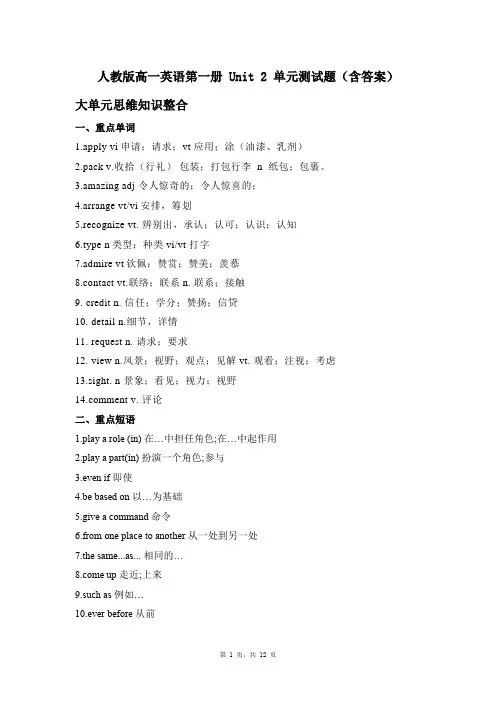
人教版高一英语第一册 Unit 2 单元测试题(含答案)大单元思维知识整合一、重点单词1.apply vi申请;请求;vt 应用;涂(油漆、乳剂)2.pack v.收拾(行礼)包装;打包行李 n 纸包;包裹。
3.amazing adj 令人惊奇的;令人惊喜的;4.arrange vt/vi安排,筹划5.recognize vt. 辨别出,承认;认可;认识;认知6.type n类型;种类vi/vt 打字7.admire vt钦佩;赞赏;赞美;羡慕8.contact vt.联络;联系n. 联系;接触9. credit n. 信任;学分;赞扬;信贷10. detail n.细节,详情11. request n. 请求;要求12. view n.风景;视野;观点;见解vt. 观看;注视;考虑13.sight. n 景象;看见;视力;视野ment v. 评论二、重点短语1.play a role (in) 在…中担任角色;在…中起作用2.play a part(in) 扮演一个角色;参与3.even if 即使4.be based on 以…为基础5.give a command 命令6.from one place to another 从一处到另一处7.the same...as... 相同的…e up 走近;上来9.such as 例如…10.ever before 从前1. It is for this reason that Spanish is the main official language of Peru.强调句型英语强调句型的基本结构是“It is/was+被强调成分+that (who)+其他成分”。
在该结构中,It is/was…that (who)…为强调句的结构词,原则上说,若将其去掉,句子意思依然清楚、结构依然完整。
如果原句是过去时,就用was,如果是现在时,就用is.强调句型可以强调主语、宾语、状语等,但不能强调谓语。
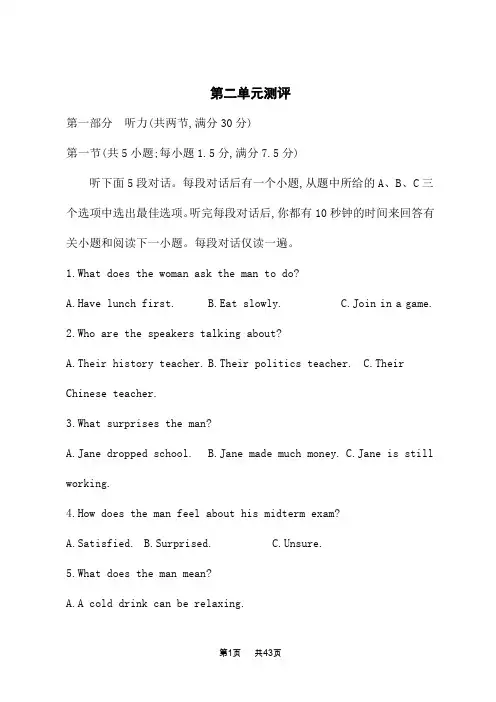
第二单元测评第一部分听力(共两节,满分30分)第一节(共5小题;每小题1.5分,满分7.5分)听下面5段对话。
每段对话后有一个小题,从题中所给的A、B、C三个选项中选出最佳选项。
听完每段对话后,你都有10秒钟的时间来回答有关小题和阅读下一小题。
每段对话仅读一遍。
1.What does the woman ask the man to do?A.Have lunch first.B.Eat slowly.C.Join in a game.2.Who are the speakers talking about?A.Their history teacher.B.Their politics teacher.C.Their Chinese teacher.3.What surprises the man?A.Jane dropped school.B.Jane made much money.C.Jane is still working.4.How does the man feel about his midterm exam?A.Satisfied.B.Surprised.C.Unsure.5.What does the man mean?A.A cold drink can be relaxing.B.Scott and Tina like to play jokes on each other.C.Humor can be helpful in embarrassing situations.第二节(共15小题;每小题1.5分,满分22.5分)听下面5段对话或独白。
每段对话或独白后有几个小题,从题中所给的A、B、C三个选项中选出最佳选项。
听每段对话或独白前,你将有时间阅读各个小题,每小题5秒钟;听完后,各小题将给出5秒钟的作答时间。
每段对话或独白读两遍。
听第6段材料,回答第6、7题。
6.Where will the package go to?A.The UK.B.The US.C.Meuch more will the man pay for the package than normal?A.10 cents.B.50 cents.C.90 cents.听第7段材料,回答第8、9题。
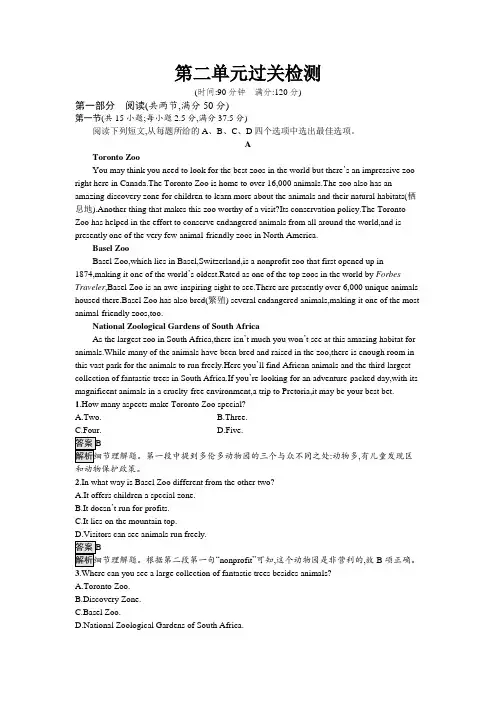
第二单元过关检测(时间:90分钟满分:120分)第一部分阅读(共两节,满分50分)第一节(共15小题;每小题2.5分,满分37.5分)阅读下列短文,从每题所给的A、B、C、D四个选项中选出最佳选项。
AToronto ZooYou may think you need to look for the best zoos in the world but there’s an impressive zoo right here in Canada.The Toronto Zoo is home to over 16,000 animals.The zoo also has an amazing discovery zone for children to learn more about the animals and their natural habitats(栖息地).Another thing that makes this zoo worthy of a visit?Its conservation policy.The Toronto Zoo has helped in the effort to conserve endangered animals from all around the world,and is presently one of the very few animal-friendly zoos in North America.Basel ZooBasel Zoo,which lies in Basel,Switzerland,is a nonprofit zoo that first opened up in1874,making it one of the world’s oldest.Rated as one of the top zoos in the world by Forbes Traveler,Basel Zoo is an awe-inspiring sight to see.There are presently over 6,000 unique animals housed there.Basel Zoo has also bred(繁殖) several endangered animals,making it one of the most animal-friendly zoos,too.National Zoological Gardens of South AfricaAs the largest zoo in South Africa,there isn’t much you won’t see at this amazing habitat for animals.While many of the animals have been bred and raised in the zoo,there is enough room in this vast park for the animals to run freely.Here you’ll find African animals and the third largest collection of fantastic trees in South Africa.If you’re looking for an adventure-packed day,with its magnificent animals in a cruelty-free environment,a trip to Pretoria,it may be your best bet.1.How many aspects make Toronto Zoo special?A.Two.B.Three.D.Five.:动物多,有儿童发现区和动物保护政策。
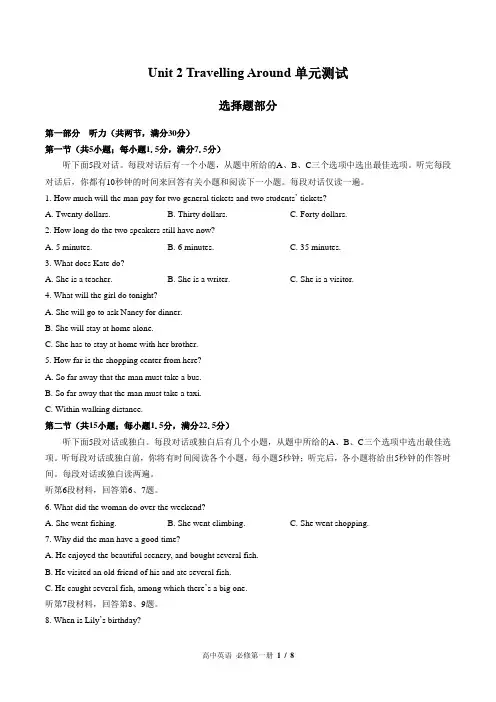
Unit 2 Travelling Around单元测试选择题部分第一部分听力(共两节,满分30分)第一节(共5小题;每小题1.5分,满分7.5分)听下面5段对话。
每段对话后有一个小题,从题中所给的A、B、C三个选项中选出最佳选项。
听完每段对话后,你都有10秒钟的时间来回答有关小题和阅读下一小题。
每段对话仅读一遍。
1. How much will the man pay for two general tickets and two students’ tickets?A. Twenty dollars.B. Thirty dollars.C. Forty dollars.2. How long do the two speakers still have now?A. 5 minutes.B. 6 minutes.C. 35 minutes.3. What does Kate do?A. She is a teacher.B. She is a writer.C. She is a visitor.4. What will the girl do tonight?A. She will go to ask Nancy for dinner.B. She will stay at home alone.C. She has to stay at home with her brother.5. How far is the shopping center from here?A. So far away that the man must take a bus.B. So far away that the man must take a taxi.C. Within walking distance.第二节(共15小题;每小题1.5分,满分22.5分)听下面5段对话或独白。
每段对话或独白后有几个小题,从题中所给的A、B、C三个选项中选出最佳选项。
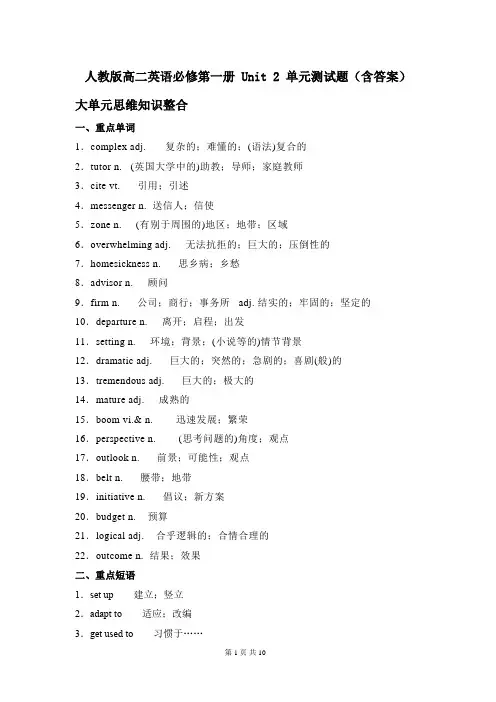
人教版高二英语必修第一册 Unit 2 单元测试题(含答案)大单元思维知识整合一、重点单词1.complex adj.复杂的;难懂的;(语法)复合的2.tutor n. (英国大学中的)助教;导师;家庭教师3.cite vt. 引用;引述4.messenger n. 送信人;信使5.zone n. (有别于周围的)地区;地带;区域6.overwhelming adj. 无法抗拒的;巨大的;压倒性的7.homesickness n. 思乡病;乡愁8.advisor n. 顾问9.firm n. 公司;商行;事务所 adj. 结实的;牢固的;坚定的10.departure n. 离开;启程;出发11.setting n. 环境;背景;(小说等的)情节背景12.dramatic adj. 巨大的;突然的;急剧的;喜剧(般)的13.tremendous adj. 巨大的;极大的14.mature adj. 成熟的15.boom vi.& n. 迅速发展;繁荣16.perspective n. (思考问题的)角度;观点17.outlook n. 前景;可能性;观点18.belt n. 腰带;地带19.initiative n. 倡议;新方案20.budget n. 预算21.logical adj. 合乎逻辑的;合情合理的22.outcome n. 结果;效果二、重点短语1.set up建立;竖立2.adapt to 适应;改编3.get used to 习惯于……4.be keen to do 渴望做5.take turns to do sth. 轮流做某事6.as well as 也;和……一样7.participate in 参加;参与8.speak up 大声点说;明确表态9.feel at home 舒服自在;不拘束10.engage in (使)从事;参与11.get involved in 参与;卷入;与……有关联12.to begin with 首先13.in addition 除……以外14.contribute to 导致;有助于15.cooperate with 和……合作16.side with 支持;站在……的一边17.as far as I know 据我所知三、重点句型1.make it ...(for sb.) to do...2.“特殊疑问词+不定式”结构四、重点用法1.Nevertheless, it will take some years before most new homes begin to use this new technology.然而,要让大多数新家庭开始使用这项新技术还需要几年的时间。
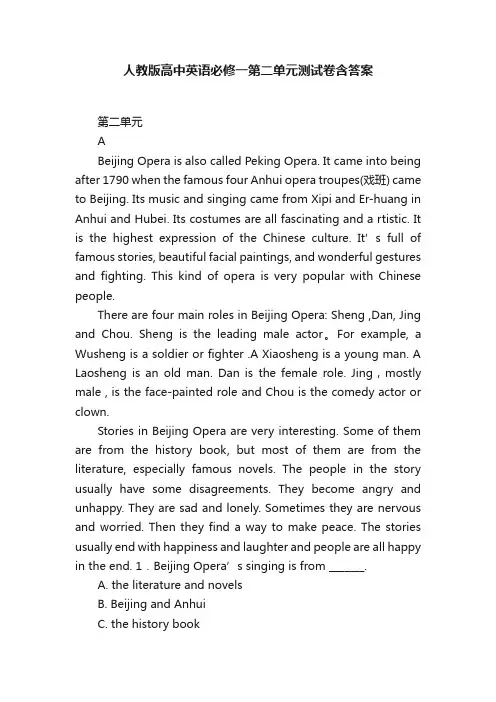
人教版高中英语必修一第二单元测试卷含答案第二单元ABeijing Opera is also called Peking Opera. It came into being after 1790 when the famous four Anhui opera troupes(戏班) came to Beijing. Its music and singing came from Xipi and Er-huang in Anhui and Hubei. Its costumes are all fascinating and a rtistic. It is the highest expression of the Chinese culture. It’s full of famous stories, beautiful facial paintings, and wonderful gestures and fighting. This kind of opera is very popular with Chinese people.There are four main roles in Beijing Opera: Sheng ,Dan, Jing and Chou. Sheng is the leading male actor。
For example, a Wusheng is a soldier or fighter .A Xiaosheng is a young man. A Laosheng is an old man. Dan is the female role. Jing,mostly male , is the face-painted role and Chou is the comedy actor or clown.Stories in Beijing Opera are very interesting. Some of them are from the history book, but most of them are from the literature, especially famous novels. The people in the story usually have some disagreements. They become angry and unhappy. They are sad and lonely. Sometimes they are nervous and worried. Then they find a way to make peace. The stories usually end with happiness and laughter and people are all happy in the end. 1.Beijing Opera’s singing is from _______.A. the literature and novelsB. Beijing and AnhuiC. the history bookD. Anhui and Hubei2.The second paragraph (段落) of the reading is about the ______of Beijing Opera.A. rolesB. storiesC. gesturesD. Paintings3.From the reading, we know the Chou most probably has a(n) _____feature.A. honestB. dullC. funnyD. serious4.Which of the following statements is TURE?A. There are only four roles in Beijing Opera.B. Peking Opera is full of different gestures.C. Beijing Opera is the most popular in the world.D. The people in the story usually are in agreement.BAs more and more people speak the global languages of English, Chinese, Spanish, and Arabic, other languages are rapidly disappearing. In fact, half of the 6,000-7,000 languages spoken around the world today will likely die out by the next century, according to the United Nations Educational, Scientific, and Cultural Organization (UNESCO).In an effort to prevent language loss, scholars from a number of organizations- UNESCO and National Geographic among them –have for many years been documenting dying languages and the cultures they reflect. Mark Turin, a scientist at the Macmillan Center, Yale University, who specializes in thelanguages and oral traditions of the Himalayas, is following in that tradition. His recently published book, A Grammar of Thangmiwith an Ethnolinguistic Introduction to the Speakers and Their Culture, grows out of his experience living, looking and raising a family in a village in Nepal.Documenting the Tangmi language and culture is just a starting point for Turin, who seeks to include other languages and oral traditions across the Himalayans reaches of India, Nepal, Bhutan, and China. But he is not content to simply record these voices before they disappear without record.At the University of Cambridge Turin discovered a wealth of important materials- including photographs, films, tap recordings, and field notes- which had remained unstudied and were badly in need of care and protection. Now, through the two organizations that he has founded-the Digital Himalaya Project and the World Oral Literature Project- Turin has started a campaign to make such documents, found in libraries and stores around the world, available not just to scholars but to the younger generations of communities from whom the materials were originally collected. Thanks to digital technology and the widely available Internet., Turin notes, the endangered languages can be saved and reconnected with speech communities.5. Many scholars are making efforts to _____.A.promote global languagesB.rescue the disappearing languagesC.search for language communitiesD.set up language research organizations.6. What does “that tradition” in Paragraph 3 refer to?A.Having first records of the languagesB.Writing books on language searchingC.Telling stories about language usersD.Linking with the native speakers7. What is Turin’s book based on?A.The cultural statics in India.B.The documents available at Yale.C.His language research in Britain.D.His personal experience in Nepal.8. Which of the following best describes Turin’s Work?A.Write, sell and donate.B.Record, repeat and reward.C.Collect, protect and reconnect.D.Design, experiment and report.CWhen I was a kid in the 1960s. my parents had a country store in the small town of Frankfort, Maine. No neighboring houses could be seen From our place,and new salesmen were always amazed at the amount of business we did. Dad's motto was, “We sell everything.” If he didn't have something in store, he would pick it up for customers on his weekly trip to Bangor.One time Dad was in Bangor getting shoes for someone at a shoe factory, He saw big boxes full of shoes and asked about them. They were the mates(一双鞋中的一只) to faulty shoes that had been thrown away. He looked through the boxes and realized that there were usable brand-new shoes in there. He offered the manager five cents a shoe, Dad made the deal and got the manager to reserve any future boxes for him.Of course Mon, his business partner, was more practical, and her first reaction was, “But what are you going to do with them?”Dad bought an old school bus. He cleaned it up, removed the seats and placed big containers do wn both sites of the aisle(通道). When all was ready, the whole Family helped to put the shoes in place. At first,it looked like we had plenty of room on the bus, but Dad kept bringing home more boxes.There was no sign on the Shoe Bus. 'The only advertising Dad did was to place a piece of paper beside the store exit that read “Shoes $1 a pair. "When folks asked about the deal. they learned it wasn’t that easy because they had to find their own pairs. The attraction was a combination of getting a good deal on a quality pair of shoes and the thrill of the hunt.To this day I still run into people who talk about the fun they had searching for pairs in Dad's Shoe Bus.. The author's parents ran their store well because9. A. they always had enough supplies in storeB. they won the great support of new salesmenC. they opened it in a very crowded neighborhoodD. they did all they could to meet their customers' need10. Why did the customers think it fun shaping in the Shoe Bus?A. There were free bus rides offered on them.B. 'They could receive better customer service.C. They could match pairs of shoes by themselves.D. There was a wide variety of shoes to choose from.11. What can we learn about the author's father from the text?A. He had a good nose for business.B. He was clever at transforming a store.C. He was patient with customersD. He had a strong preference for bargains.DMirroring China’s Past: Emperors and Their BronzesChinese bronzes (青铜) of the second and first millennia BC are some of the most distinctive achievements in the history of art. These vessels (容器) were made to carry sacrificial offerings, to use in burial or to honor noble families in public ceremonies. When they were found by emperors centuries later, these spiritually significant objects were seen as signs of heavenly messages about a ruler or a dynasty and became prized items in royal collections. This exhibition —the first to explore these ancient objects throughout Chinese history —presents a rare opportunity to experience a large number of these works together in the United States.Unlike Greek and Roman bronze sculptures of human and animal forms, most objects from Bronze Age China (about 2000 - 221 BC) were vessels for ceremonial use. Beginning with the Song dynasty (960 - 1279), emperors unearthed these symbolic works and began collecting them, considering them to be evidence of their own authority as rulers. In addition to impressive collections, the royal fascination with bronzes led to the creation of numerous reproductions and the comprehensive cataloguing of palace holdings. These catalogues are works of art themselves, featuring beautiful drawings and detailed descriptions of each object.From the 12th century onward, scholars and artists also engaged in collecting and understanding ancient bronzes. Unlike emperors, scholars regarded bronzes as material evidence of their efforts to recover and reconstruct the past, and they occasionally exchanged them as tokens (象征) of friendship. Today ancient bronzes still occupy a primary position in Chinese culture —as historical objects and as signifiers of an importantcultural heritage that inspires new generations, as seen in the works of contemporary artists on view in this presentation.Mirroring China’s Past brings together approximately 180 works from the An Institute of Chicago’s strong holdings and from the Palace Museum in Beijing, the Shanghai Museum, and important museums and private collections in the United States. By providing viewers with a new understanding of ancient bronzes and their significance through time, the exhibition demonstrates China’s fascinating history and its developing present.12. In what way are Chinese bronzes different from Greek and Roman ones?A. They fascinated the royal family.B. They took animal or human forms.C. They served ceremonial purposes.D. They were important cultural heritage.13. What does the author think of catalogues of bronzes?A. Unreal.B. Creative.C. Artistic.D. Necessary.14. What can we infer about the exhibition according to the text?A, h is held in China. B. It is arranged by time.C. It is organized by scholars.D. It includes modem artworks.15. What does the underlined word “holdings” in the last paragraph refer to?A. Viewers.B. Collections.C. Museums.D. Art dealers.根据短文内容,从短文后的选项中选出能填入空白处的最佳选项。

人教版版高中英语测试题必修一Unit 2《English around the world》单元测试1笔试部分:I. 单项选择21. — How was your weekend?—Great! We ______ a picnic by the lake.A. haveB. are havingC. hadD. will have22. He looked at the envelope and __________ Jenny's handwriting immediately.A. understoodB. knewC. recognizedD. recovered23. A large number of students in our school ____ from the countryside; the number _____ growing these years.A. is; has beenB. are; has beenC. is; have beenD. are; have been24. Washington D.C., the capital of the United States, is one of ______ cities in the world.A. the biggestB. biggerC. much biggerD. big25. One of her American friends asked her, “Would you please ______ to my apartment for a visit?”A. come upB. keep upC. put upD. catch up26. — Excuse me? ______—It is over there, near the bus stop.A. How do you like the cinema?B. May I ask you the way?C. Where is the Bank of China?D. How far is the market from here?27. The ______ from England to India used to take more than six months as there were storms and huge waves at times.A. travelB. journeyC. tripD. voyage28. — Mum, ______ I play computer games?—Yes, you can. But you have to finish your homework first.A. mustB. mayC. willD. need29. English has become the most wildly spoken language in the world ______ its special role as an international language.A. becauseB. FromC. withD. because of30. Chinese is also spoken in many other countries in Asia, ______ Singapore and Malaysia.A. for exampleB. such asC. instead ofD. according to31. American English has so many _________ because the American people have come from allover the world.A. grammarB. vocabularyC. pronunciationsD. dialects32. I don't know ______ tomorrow. Can you tell me?A. when we startedB. when did we startC. when we will startD. when will we start33. Kitty and Lucy are both from England, so they are ______ English speakers.A. nativeB. internationalC. foreignD. same34. — John has hurt his leg.—Really? ______?A. Who did thatB. How did that happenC. What's wrong with himD. Why was he so careless35. Americans and Canadians can understand each other ______ they don't speak the same kind of English.A. now thatB. even ifC. as ifD. only if第二节完形填空(共20小题; 每小题1.5分, 满分30分)“Dad, I'm sure I can do it well th is time. I promise,” I said to myself and went up to the stage and began my play ...Finally I 36 from my piano and took a bow to the people in the hall. There was a 37 and then loud applause (掌声) burst out. I knew I 38 it. Tears filled my eyes. Then I 39 three years ago right here when it was my turn to play. I 40 the hall and saw my dad. He sat at the end of a 41 with a serious face.Suddenly I became 42 . I had practiced my piece for months, 43 then it seemed there was something wrong with my fingers. I forced out some 44 tune and left the stage in tears. I 45 .On the way home my father didn't say even a word. He just 46 the car in silence. I didn't say anything either. What could I say, really, after what I'd done? I knew how 47 Dad worked to earn enough money 48 my piano. That time he was 49 to come to a competition(比赛), but I let him down.I didn't remember how we got home. Dad never said a word the entire way home, and he never 50 one of my competitions again. I never got over the hurt of having 51 the person I most wanted to make proud. I'd 52 more than my competition that afternoon. I felt as if I'd lost the key to my father's heart, and he died before I could 53 it again.“God, why didn't you give me a 54 to make it up to him?” I'd often asked.I won first prize in the contest now. How I wish my father could share the 55 moment with me!36. A. dropped B. rose C. turned D. slid37. A. silence B. noise C. laughter D. shout38. A. got B. missed C. made D. caught39. A. thought B. realizedC. understoodD. remembered40. A. looked up B. looked aroundC. looked outD. looked over41. A. seat B. row C. group D. team42. A. nervous B. excited C. sick D. tired43. A. and B. though C. but D. so44. A. soft B. moving C. nice D. terrible45. A. succeeded B. wonC. failedD. disappeared46. A. drove B. started C. washed D. repaired47. A. quickly B. hard C. Warmly D. happily48. A. on B. in C. for D. with49. A. sad B. happy C. able D. unable50. A. attended B. noticed C. heard D. cared51. A. pleased B. surprisedC. disappointedD. satisfied52. A. felt B. lost C. made D. learned53. A. open B. close C. forget D. find54. A. piano B. duty C. chance D. contest55. A. exciting B. surprisingC. interestingD. relaxing第三部分阅读理解(共20小题;每小题2分,满分40分)AMany centuries ago, all people had to gather seeds and plants to eat. They did not know how to farm or raise animals for food. We call them the Stone Age people because they used stone tools and weapons.You may feel s urprised in the world today there are still people who live like the Stone Age people. They live in the places that are hard to reach. Because they have met few people from the outside world, they don't know about modern inventions. They have not learned ways of doing things from others.For 25,000 years, groups of people have lived alone in the middle of Australia. One of these groups is the Arunta tribe (部落). They do not know how to farm and how to raise sheep or cattle.The Aruntas spend most of their time searching for food and water. The men hunt animals with stone-tipped spears. The women and children look for roots, seeds and nuts. They use sticks to dig up the roots. Several Arunta families live together. They have no house. At night, they sleep around small fires.Now other people are moving into the center of Australia. Soon the Aruntas will no longer bea Stone Age people.56. The Stone Age people are called so because they ____.A. gathered seeds and plants to eatB. didn't know how to farmC. used stone tools and wea ponsD. didn't raise animals for food57. The Arunta tribe has lived ________.A. in the middle of AfricaB. in the center of AustraliaC. together with other peopleD. in poorly built houses58. Why do the Aruntas still live in the way as they lived before?A. Because they have not yet learned new ways from other people.B. Because they do not want to change their way of living.C. Because other people are moving in and living with the Aruntas.D. Because each family live alone without knowing others.59. It can be inf erred from the passage that ________.A. the Australians live much like the Stone Age peopleB. the Arunta tribe has a history of 25 centuriesC. the Stone Age people have at last disappeared in the worldD. the Aruntas will change their way of living sooner or laterBThere are more than 250,000 rivers in the United States. Added up together, they flow for more than 5,500,000 kilometers.The largest and most famous river in the United States is the Mississippi. It starts near the northern border of the United States and flows through the center of the country for more than 3,700 kilometers. About 250 smaller rivers flow into the Mississippi. The mouth of the Mississippi empties into the Gulf of Mexico.However, the Missouri River is the longest river in the United States. It flows for about 4,000 kilometers. It begins in the Rocky Mountains of North America. It flows along the borders of seven states before it empties into the Mississippi River near the city of Saint Louis, Missouri.Three rivers that join together in the north central state of Montana form the Missouri River. The water is clear there. But, as it moves east and south, the Missouri River turns brown as it collects huge amounts of dirt from the land. That is why many people call the Missouri River the “Big Muddy”.Some people say the Columbia River in the northwest is the most beautiful river in America. It flows from the Canadian province of British Columbia into the United States through the state of Washington. The Columbia River is the largest river that empties into the Pacific Ocean.Another famous river is the Rio Grande. It is the longest river in the state of Texas. It forms the border between Texas and Mexico.The oldest river in the United States is the New River. It begins in the Appalachian Mountains of North Carolina and flows north through parts of Virginia and West Virginia. The New River may be also the second oldest in the world. It is funny how something so old can be called new.60. Near the city of Saint Louis is the place ________.A. where the Missouri River risesB. where the Missouri River joins the Mississippi RiverC. where other three rivers join the Missouri RiverD. where the Mississippi River flows into the ocean61. From Paragraph 4 we know that the water in the upper reaches of the Missouri River is ________.A. muddyB. dirtyC. clearD. brown62. In the state of Washington you can visit the beautiful ___.A. Missouri RiverB. Mississippi RiverC. New RiverD. Columbia River63. Which of the following rivers is the border between Texas and Mexico?A. The Rio Grande River.B. The New River.C. The Columbia River.D. The Mississippi River.CNowadays many students are interested in studying abroad.Attending schools abroad has many advantages. First, by looking at our own country from outside, we can best see the strong points and weak points of our nation and therefore widen our vision and broaden our minds. Second, while studying in a foreign country, we can travel widely, visiting famous scenic spots and making friends with the local people. Third, we can use the foreign language in our daily life so that our ability in that language may be improved quickly. But the most important is to learn advanced science and technology. For all these advantages, it is really worthwhile to go abroad for education.However, as everything has t wo sides, there are also some disadvantages in attending a foreign university. The most serious problem is the language barrier (障碍). Most of the students who are ready to go abroad do not prepare themselves well for the new language environment. As a result, on arriving there, they will find it difficult to understand what the instructors are saying in class. Besides, for not knowing about the customs and way of life of the local people, they may run into trouble in dea ling with various situations. Therefore, misunderstandings often arise. Furthermore, the cost of living is much higher than that in our country, so most students have to find part-time jobs in ord er to help support themselves. Faced with these difficulties, many students find themselves unable to pay full attention to their studies and some students may even fail in their courses and learn little.Therefore, given an opportunity to attend a school abroad, one must consider the factors carefully before making up his mind. On the one hand, it is a good thing to go and study abroad. But on the other hand, one must not neglect (忽视) the disadvantages.64. The following are all advantages of studying abroad EXCEPT ________.A. having more chances to get good jobsB. improving foreign language ability quicklyC. visiting well-known scenic spotsD. learning advanced science and technology65. The underlined word “instructors” in Paragraph 3 is closest in meaning to ________.A. neighborsB. teachersC. strangersD. classmates66. Why do some students find part-time jobs?A. Because they want to learn more skills in a different country.B. Because they want to make full use of their spare time.C. Because they are not interested in studying.D. Because they have to support themselves.67. The passage mainly tells us that ________.A. studying abroad is a good way to learn advanced science and technologyB. everything has two sidesC. people should think twice before going abroadD. going abroad has more advantages than disadvantagesDThere is a lake near a forest in Sweden. The water in the lake is very clear and everything is quiet and still. On the far side of the water is some farmland and further away, across the field, is an old church built on a hill. It has just stopped raining. The brook flowing into the lake is full and there is still some half-melted (半融化的) snow from last winter on the ground.The reason why the water is so clear and everything is so quiet and still is that most of the animals and plants in and around the lake are dead. There are no birds because all the fish and insects, which the birds need for food, have disappeared. Many trees in the forest are losing their leaves and bark (树皮), and are sick and dying. Others were blown down by the strong winds of last winter. A farmer is working in a field planting something, but unless he plants a stronger kind of seed this year, the crop will be between 25 to 40 percent lower than a few years ago. The stones of the old church tower are turning to powder and unless the tower is repaired soon, it will fall down.All the death a nd destruction (破坏) in this place is caused by the smoke coming out of factories and poisonous gases from cars and trucks. And yet this silent lake is hundreds of kilometers away from the nearest factory and highway.68. Which season do you think it is?A. Spring.B. Summer.C. Autumn.D. Winter.69. Why are there no animals or birds in or around the lake?A. Because the weather is terribly cold.B. Because the lake is quiet.C. Because the area is seriously polluted.D. Because they have all been killed.70. Why does the farmer have to plant a stronger kind of seed?A. Because the soil is becoming less and less.B. Because few plant life can stand the weather there.C. Because the water in the lake can't be used to irrigate (灌溉) the field.D. Because the soil there is becoming unfit for farming.71. What do you think is the best title of the passage?A. A beautiful place of interest.B. A polluted place.C. A quiet place in Sweden.D. A faraway mountain area.EOne of the most difficult things for children to deal with when moving to a new town is leaving their friends and making new ones.We once moved and one of our new neighbors told us about a summer camp at the Recreation Center all the kids went to. My husband and I looked into it and we found it was unbelievably cheap. I had the kids sign up (报名) the next day so that they could know more kids there.Another thing we did was to have them sign up for sports when school started. They were happy to be on teams with new friends they made. This also gave me a chance to meet new people and from them I s ometimes got some useful ideas for my new books.If you're just moving to a new house in the same city you live in now, it won't really be a problem unless your kids are changing schools. If they are, it is a great idea to have them take the address book to school. Thus, your children won't feel “lost” without their old friends.If you're able to, over the summer vacation, try inviting the friend your child misses most to come and visit your new home for a week, or even a few weeks. I know this can be difficult if that child has to fly, but maybe you can work out a plan with the child's parents. Think how happy the kids will be when they meet!72. The author had her kids sign up for the summer camp mainly because _____.A. she could afford the costB. she was asked to do so by her kidsC. it could give her kids a chance to meet more kidsD. it could make the summer holiday not so boring73. What is probably the author?A. A housewife.B. A business woman.C. A teacher.D. A writer.74. What we can't learn from the passage is that ____.A. a summer camp at the Recreation Center was very cheapB. having the kids take part in sports is good for both the author and her kidsC. parents should ask their children not to think of their old friendsD. parents should create more chances for children to make new friends75. The purpose of the passage is to teach parents how to ______ when they move to a new place.A. get used to the new life in a short timeB. help their children make new friends and keep the old onesC. get along with their new neighborsD. help their children get used to the new school life第二节书面表达假如你在暑假期间参加了一个英语夏令营,在该夏令营结束时举行的晚会上,你要对这次夏令营进行简单总结,并表达感谢。
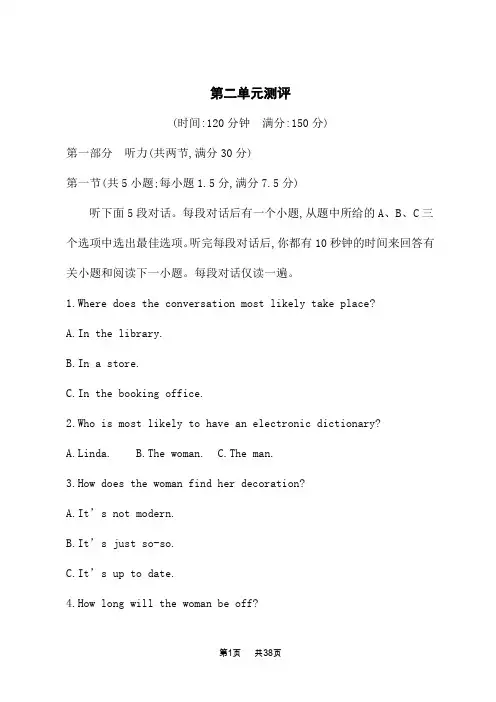
第二单元测评(时间:120分钟满分:150分)第一部分听力(共两节,满分30分)第一节(共5小题;每小题1.5分,满分7.5分)听下面5段对话。
每段对话后有一个小题,从题中所给的A、B、C三个选项中选出最佳选项。
听完每段对话后,你都有10秒钟的时间来回答有关小题和阅读下一小题。
每段对话仅读一遍。
1.Where does the conversation most likely take place?A.In the library.B.In a store.C.In the booking office.2.Who is most likely to have an electronic dictionary?A.Linda.B.The woman.C.The man.3.How does the woman find her decoration?A.It’s not modern.B.It’s just so-so.C.It’s up to date.4.How long will the woman be off?A.A day.B.A morning.C.An afternoon.5.How will the man go to Beijing?A.By train.B.By bus.C.By plane.第二节(共15小题;每小题1.5分,满分22.5分)听下面5段对话或独白。
每段对话或独白后有几个小题,从题中所给的A、B、C三个选项中选出最佳选项。
听每段对话或独白前,你将有时间阅读各个小题,每小题5秒钟;听完后,各小题将给出5秒钟的作答时间。
每段对话或独白读两遍。
听第6段材料,回答第6至8题。
6.What month is it most likely now?A.January.B.March.C.June.7.What season was the BEST season last year?A.Spring.B.Summer.C.Autumn.8.When was the nice period last year?A.September and October.B.October and November.C.March and April.听第7段材料,回答第9至11题。
SectionⅡReading and Thinking课后·训练提升一、根据句意及首字母提示写出单词.The door is too n for us to move the big sofa into the living room..They rented a f in the centre of the city..Zhu Yuanzhang was one of the e in the Ming Dynasty..The film actor often wears sunglasses to avoid being r.’s fingerprints(指纹) are u.6.The Chinese people usually a the moon,enjoying mooncakes on the Mid-Autumn.English is one of the o languages used in India..The Internet helps us stay in c with our friends..The sun is the major s of energy for our planet.’t learnt to t on the computer.(power) body.2.It is said that Mr Green has unique way of making his class interesting and(architect).one of the greatest works of this century.(official) recognised language school.1.悉尼是一座位于太平洋沿岸的城市。
.2.就是因为下雨他才没有来的。
because of the rain he failed to come.3.每天我通常花半个小时锻炼。
人教版高一英语必修一Unit2练习题及答案Unit 2English around the world第一节单项填空(共15小题;每小题1分,满分15分)从A、B、C、D四个选项中,选出可以填入空白处的最佳选项。
21.—Can I take tomorrow off?—________?Do you have something important to do?A.What for B.Why notC.So what D.How come答案A [句意:——明天我可以请假吗?——为什么?你有要紧事要做吗?What for询问原因,意思是“为什么”,符合语境。
Why not?表示赞成,意思是“好啊;为什么不呢”。
So what 常表示不屑一顾,意思是“那又怎么样呢”。
How come表示惊奇、难以置信,意思是“怎么会呢”。
] 22.Here is Jack's ________ card and you can find his name,picture,date of birth,and other information on it.A.survey B.identity C.journal D.item答案 B [根据语境“上面有他的姓名、照片、出生日期和其他信息”可知应选identity。
identity card“身份证”。
]23.By the end of last week,he ________ in this company for two years.A.had worked B.has workedC.has been working D.worked答案 A [考查时态。
根据“by the end of last week”可知时间为过去的过去,故应用过去完成时。
句意:到上周末为止,他已经在这家公司工作两年了。
]24.________ on ten years of observation and study,the theory shows that everyone dreams ever night,whether they realize it or not.A.Basing B.BasedC.Being based D.Having based答案 B [考查非谓语动词作状语。
第二单元测试班级:姓名:一、汉译英(20’)1. n. 地下人行道;地铁2. n. 新加坡3. n. 电梯;升降机4. n. 马来西亚5. n.(英)汽油6. n. 使用;用法7. n. 汽油;气体;煤气;毒气8. n. 西班牙人;西班牙语9. n. 航行;航海10. n. 命令;指令11. n.(美)公寓住宅12. n. 请求;要求13. n. 丹麦语14. n. 词语;表示;表达15. n. 词汇;词汇量16. n. (英)卡车17. n. 拼写;拼法18. n. 口音;强调;重音19. n. 本身;本体;身份20. n. 闪电21. n. 街区;块;木块;石块22. n. 出租车23. vt. 以……为根据24. vt. 辨认出;承认;25. adj. 官方的;正式的26. adj. 西班牙(语)的27. adj. 逐渐的;逐步的28. adj. 东方的;东部的29. adj. 较后的;后半的30. adj. 西北方的31. adj. 流利的;流畅的32. adj. 东南方的33. adj. 频繁的;常见的34. adj. 非洲(人)的35. adj. 中西部的36. adj. 本国的;本地的37.adv. 实际上,事实上38.adv. 直接;挺直39. 扮演一个角色;参与40. 走近;上来;提出二、英译汉(20’)1. conquer2. poster3. enrich4.at present5. dialect6.no such thing7. rapid 8. spelling mistakes9. separate 10.hold on11. rule 12.get out of water13. spider 14. climb a tree15. theatre 16.to this day17. repeat 18.be different from 19. standard 20. be different in21. expect 22.decide to do sth. 23. neighbouring 24.plan to do sth. 25. geography 26.at the end of27. stress municate with 29. intonation 30.believe it or not31. candy 32.in this way33. truck 34.take note of35. dialogue 36.entire37. tell A from B 38.exact39. go to the pictures 40.impression三、单选(15’)1. — How was your weekend?—Great! We ______ a picnic by the lake.A. haveB. are havingC. hadD. will have2. He looked at the envelope and __________ Jenny’s handwriting immediately.A. understoodB. knewC. recognizedD. recovered3. A large number of students in our school ____ from the countryside; the number _____ growing these years.A. is; has beenB. are; has beenC. is; have beenD. are; have been4. Washington D.C., the capital of the United States, is one of ______ cities in the world.A. the biggestB. biggerC. much biggerD. big5. One of her American friends asked her, “Would you please ______ to my apartment for a visit?”A. come upB. keep upC. put upD. catch up6. — Excuse me? ______—It is over there, near the bus stop.A. How do you like the cinema?B. May I ask you the way?C. Where is the Bank of China?D. How far is the market from here?7. The ______ from England to India used to take more than six months as there were storms and huge waves at times.A. travelB. journeyC. tripD. voyage8. — Mum, ______ I play computer games?—Yes, you can. But you have to finish your homework first.A. mustB. mayC. willD. need9. English has become the most wildly spoken language in the world ______ its special role as an international language.A. becauseB. fromC. withD. because of10. Chinese is also spoken in many other countries in Asia, ______ Singapore and Malaysia.A. for exampleB. such asC. instead ofD. according to11. American English has so many _________ because the American people have come from all over the world.A. grammarB. vocabularyC. pronunciationsD. dialects12. I don’t know ______ tomorrow. Can you tell m e?A. when we startedB. when did we startC. when we will startD. when will we start13. Kitty and Lucy are both from England, so they are ______ English speakers.A. nativeB. internationalC. foreignD. same14. — John has hurt his leg.—Really? ______?A. Who did thatB. How did that happenC. What’s wrong with himD. Why was he so careless15. Americans and Canadians can understand each other ______ they don’t speak the same kind of English.A. now thatB. even ifC. as ifD. only if四、完形填空(15’)So why has English changed 1 time? Actually all 2 change and develop when cultures meet and communicate 3 each other. At first the English 4 in England between about AD 450 and 1150 was very different 5 the English spoken today. It was based more on German than the English we speak at present. Then gradually between about AD 800 and 1150, English became less like German 6 those 7 ruled England spoke first Danish and 8 French. These new settlers enriched the English language and 9 its vocabulary. So by the 1600’s Shakespeare was able to 10 use of a wider vocabulary than ever before.1. A. in B. on C. over D. at2. A. English B. Chinese C. American D. languages3. A. with B. to C. at D. in4. A. spoken B. speak C. speaking D. spoke5. A. in B. from C. with D. at6. A. because B. because of C. as D. for7. A. which B. who C. whom D. in which8. A. later B. latter C. late D. lately9. A. especial B. especially C. special D. specially10. A. find B. do C. take D. make五、阅读理解(20’)AA student is learning to speak British English. He wonders: Can I communicate with Americans? Can they understand me? Learners of English often ask: What are the differences between British and American English? How important are these differences?Certainly, there are some differences between British and American English. There are a few differences in grammar. For example, speakers of British English say “in hospital” and "Have you a pen?” , Americans say “in the hospital” and ‘Do you have a p en?’. Pronunciation is sometimes different. Americans usually sound theirs in words like “bird” and “hurt”. Speakers of British English do not sound theirs in these words. There are differences between British and American English in spelling and vocabular y. For example, “colour” and “honour” are British, “color” and “honor” are American.These differences in grammar, pronunciation, spelling and vocabulary are not important, however. For the most part, British and American English are the same language.1.According to this passage, a student who is learning to speak American English might be afraid that __________.A. British people cannot understand himB. American people cannot understand himC. the grammar is too hard for himD. the spelling is too hard for him2.American English and British English are different in __________.A. spellingB. pronunciationC. grammarD. all of the above3. What is NOT mentioned(提及) in the passage?A. Whether there are differences between British English and American English.B. Whether British English and American English are one language or two.C. How the differences between British English and American English came about.D. How important the differences are.4.Most __________ say “Do you have a watch?”A. British peopleB. AmericansC. childrenD. teachers5.According to this passage, British people and Americans have __________ difficulty in understanding each other.A. littleB. muchC. someD. greatBFive years ago, I was sent to a better middle school. For me, everything there was new and strange. After I had been there for two months, there was an important test in the middle of the term. It covered all my courses. In that test, I didn’t get a good grade, but most of my classmates got an A or A-.It made me upset for a long time. I felt everything in the world was changing. I thought my classmates were all better than me. During those days I was very unhappy.One day, my aunt, after talking with my teachers, talked to me. She told me to think about what I had done in the past and what I should do in the future. I was shocked by her words. I thought about what I had done during the past months, and I found I had done nothing to improve my grades. I thought I should work harder.After that, I paid more attention to the teachers’ talking in the classes, and I asked my teachers or my classmates when I didn’t understand something. I studied very late at night when I met with difficult problems. Most of all, I came to understand the importance of taking notes in class. As a result, I did better in some tests.About three months later, the most important test came at the end of the term. This time, I stood out not only in my class but also in the grade. From then on, I have tried to do my best when I do something because I know if I want something, I should work hard for it.1. Why did the writer fall behind in the new middle school?A. Because the teachers didn’t treat him well enough.B. Because the subjects were becoming more difficult.C. Because he hated the life in the new school.D. Because he didn’t put his heart into study.2.What does the underlined word “shocked” in the third paragraph mean?A. sadB. happyC. worriedD. surprised3. What did the writer’s aunt do to help him out?A. She punished him for not working hard.B. She helped him find out the reasons for his poor performance.C. She forced him to work harder.D. She asked his teachers to talk with him about his problems.4. Which of the following studying methods helped the writer most?A. Asking teachers for help when in difficulty.B. Working deep into the night every day.C. Making notes in class.D. Listening to every word his teachers said.5. What does the underlined sentence in the last paragraph mean?A. The writer failed again in the exam.B. The writer did very well in the exam.C. The writer became the cleverest in the class.D. The writer was very proud of his progress.六、单句改错(10’)1.There are more than one panda in the park now.2.Our Chinese teacher asked a very difficult question, but Rose came up a goodanswer in a minute.3.This novel is basing on a true story.4.So make the worst of this test, and don’t ask why.5.I have seen no such a person in the world.6.John suggested have a test tomorrow.7.I know he cried because what I said.8.The part that he made in this new film was very important.9.I came here especially to see you.10.He is very good at English, and now he is planning to learn the second foreignlanguage.。